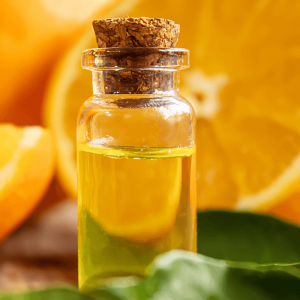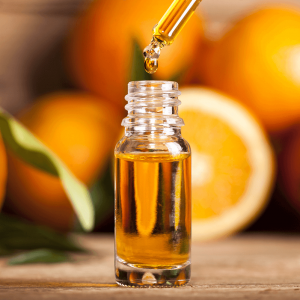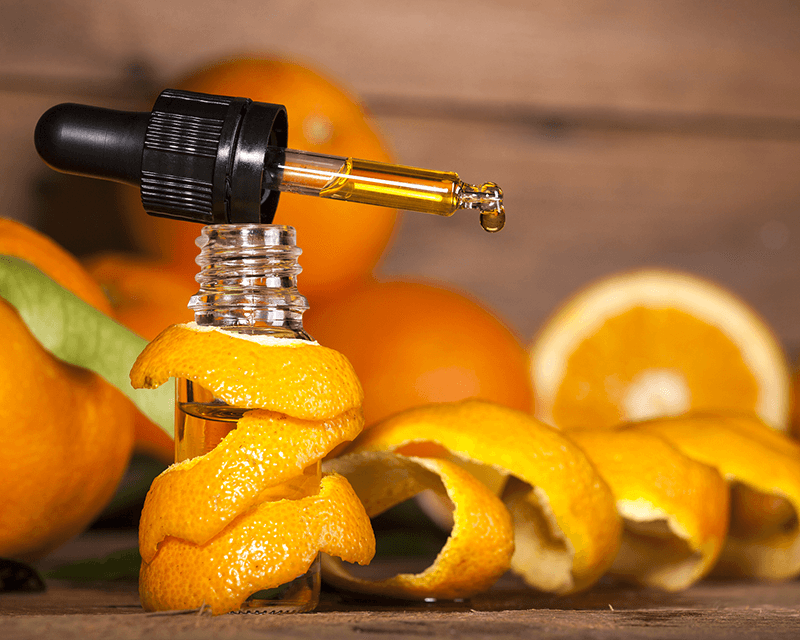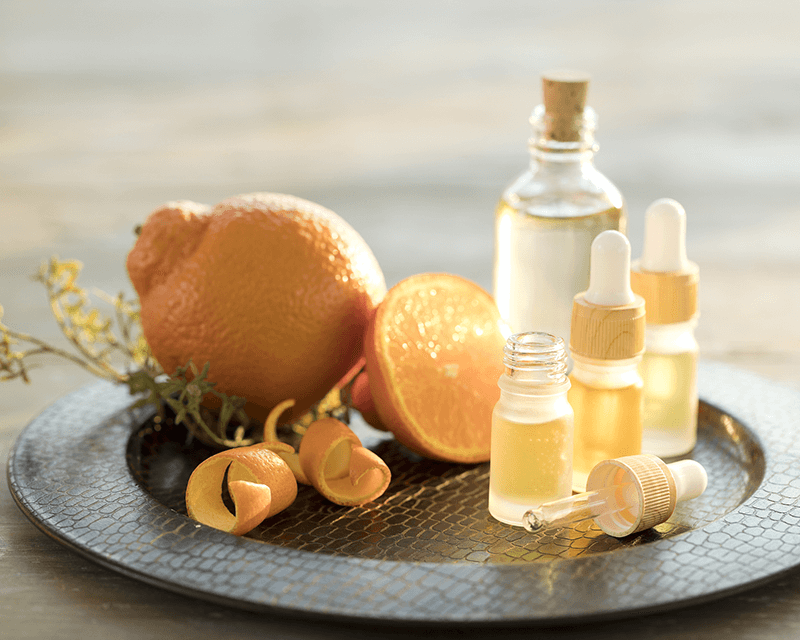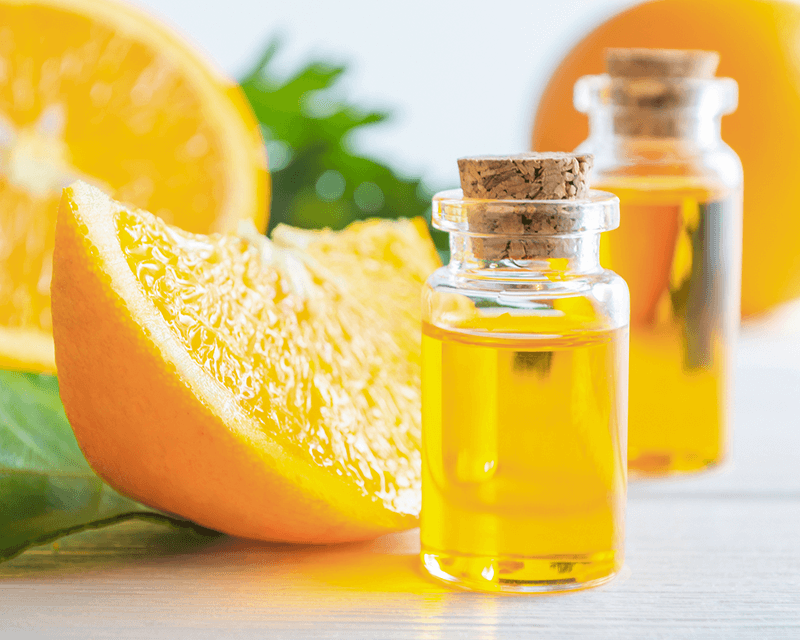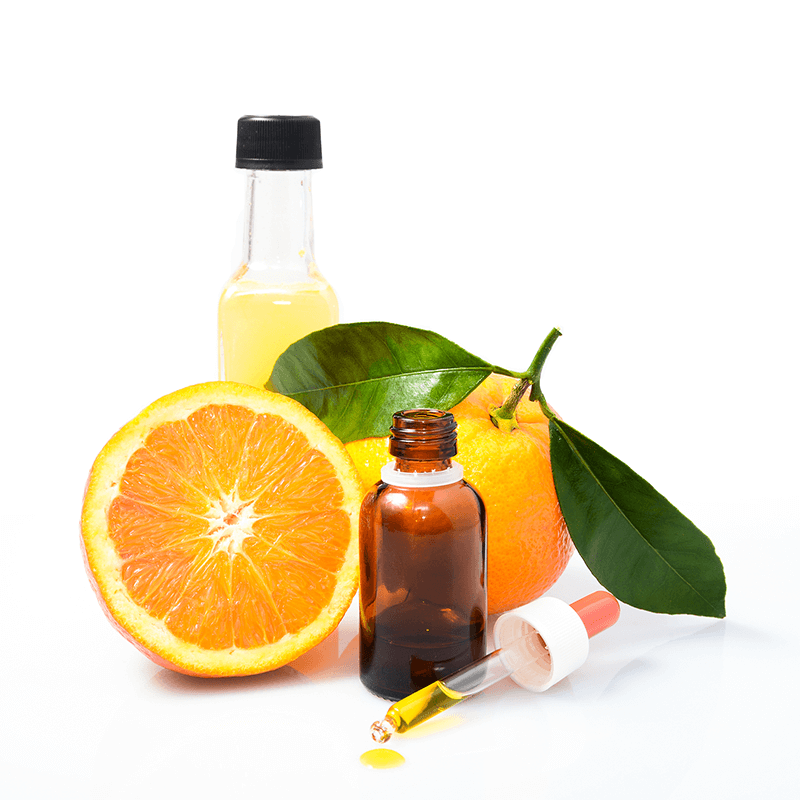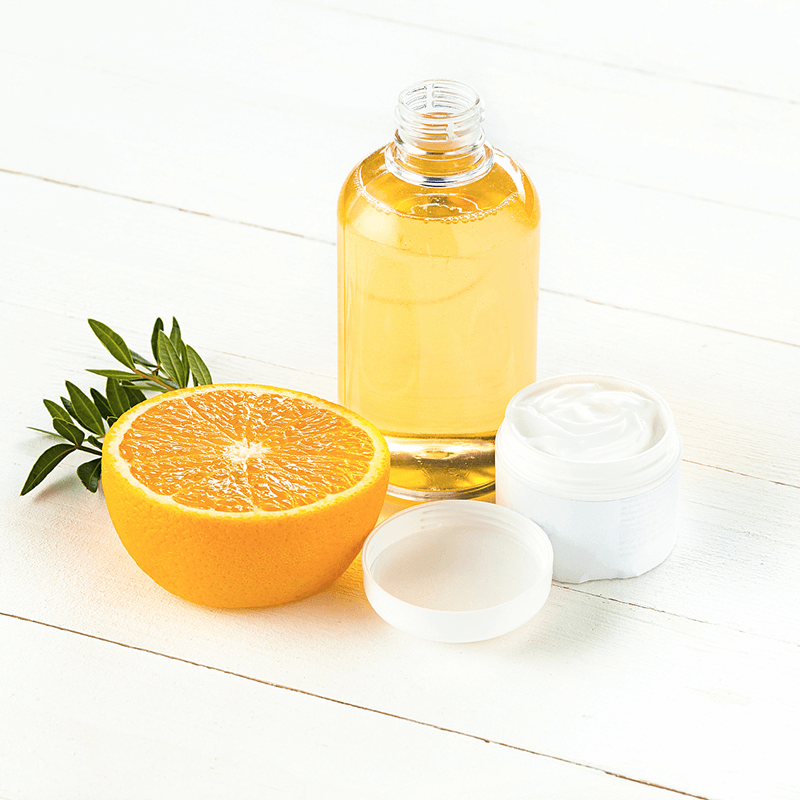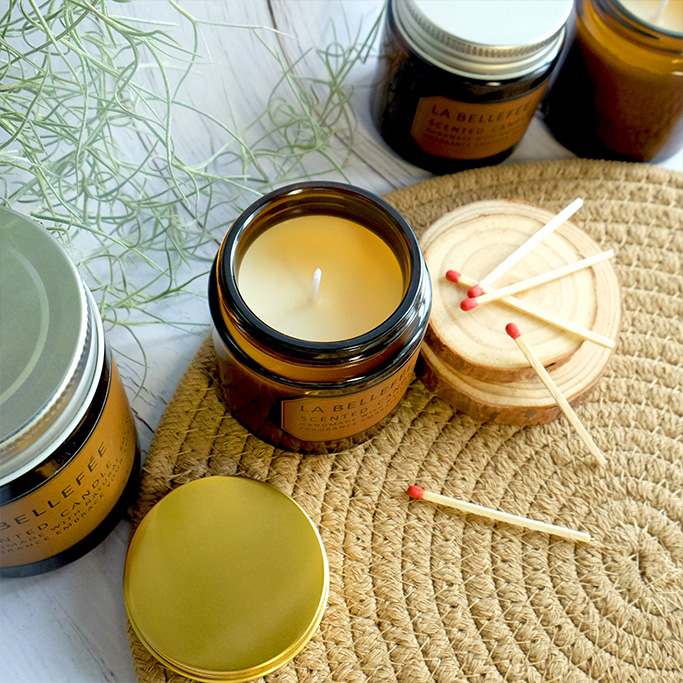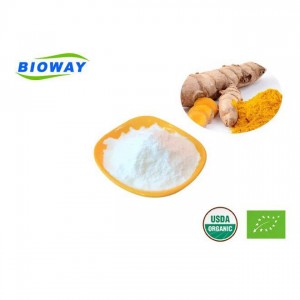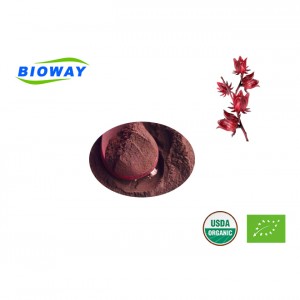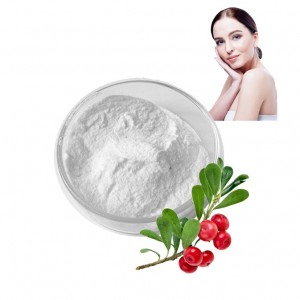Pure Natural Sweet Orange Peel Oil
Pure natural sweet orange peel oil is an essential oil derived from the peel of ripe sweet oranges (Citrus sinensis). It is extracted through a cold-pressing method that preserves the natural aroma and therapeutic properties of the orange peel. The oil is often yellowish-orange in color with a fresh, sweet, and citrusy fragrance.
Sweet orange peel oil is known for its numerous beneficial properties, including anti-inflammatory, antiseptic, antidepressant, and immune-stimulating effects. It is rich in vitamins and antioxidants, making it a popular ingredient in various skincare products and aromatherapy practices.
The oil is widely used in aromatherapy to uplift mood, reduce stress, and induce a sense of relaxation. It is believed to have a refreshing and energizing effect on both the mind and body. Additionally, sweet orange peel oil can be used in natural remedies for digestive issues, such as bloating, indigestion, and nausea.
In skincare, sweet orange peel oil is popular for its ability to promote healthy-looking skin. It is often used to brighten dull skin, reduce the appearance of blemishes, and improve overall skin tone and texture. The oil can be added to facial cleansers, toners, moisturizers, and homemade skincare products.
Sweet orange peel oil can also be used in hair care to improve the health and shine of the hair. It is believed to help in reducing scalp dryness, dandruff, and hair breakage. The oil can be added to shampoos, conditioners, or used as a scalp massage oil.
When using sweet orange peel oil topically, it is important to dilute it with a carrier oil, such as coconut oil or jojoba oil, before applying it to the skin. It is also recommended to do a patch test on a small area of the skin to check for any potential allergic reactions.
Please note that while sweet orange peel oil is generally considered safe, some individuals may be sensitive to citrus essential oils, so caution is advised. It is always a good idea to consult with a healthcare professional or aromatherapist before using any essential oils for therapeutic purposes.
| Acrous Gramineus Oil | Orange Sweet Oil |
| Place of Origin | China |
| Type | Pure Essential Oil |
| Raw Material | Peels (Seeds also available) |
| Certification | HACCP, WHO, ISO, GMP |
| Supply Type | Original Brand Manufacturing |
| Brand Name | Herbs Village |
| Botanical Name | Apium graveolens |
| Appearance | Yellowish to a greenish brown clear liquid |
| Odor | Fresh herbal green phenolic woody odor |
| Form | Clear liquid |
| Chemical Constituents | Oleic, Myristic, Palmitic, Palmitoleic, Stearic, Linoleic, Myristoleic, Fatty Acids, Petroselinic |
| Extraction Method | Steam distilled |
| Mixes well with | Lavender, Pine, Lovage, Tea Tree, Cinnamon Bark, and Clove Bud |
| Unique features | Antioxidant, antiseptic (urinary), anti-rheumatic, antispasmodic, aperitif, digestive diuretic, depurative & stomachic |
100% Pure and Natural: The sweet orange peel oil is made from carefully extracted and steam-distilled orange peels, ensuring that it is free from any additives, fillers, or synthetic ingredients.
Pleasant Aroma: The sweet orange peel oil has a refreshing and invigorating citrus scent, reminiscent of freshly peeled oranges. It provides a delightful aromatic experience for use in aromatherapy and personal care products.
Therapeutic Properties: The oil is known for its numerous therapeutic properties, including being antiseptic, anti-inflammatory, and mood-enhancing. It can help uplift the mood, relieve stress, and promote relaxation.
Versatile Usage: Sweet orange peel oil can be used in various ways. It can be used as a natural perfume, added to diffusers for aromatherapy, mixed into skincare products like lotions and creams, or combined with carrier oils for massage.
Skincare Benefits: The oil is rich in antioxidants and vitamin C, which can help improve the appearance of the skin by promoting collagen production, reducing signs of aging, and brightening the complexion. It can also be used to cleanse and clarify the skin.
Haircare Benefits: Sweet orange peel oil can be added to hair products like shampoos and conditioners to help stimulate hair growth, reduce dandruff, and add shine and luster to the hair.
Natural Cleaning Agent: The oil has antimicrobial properties, making it an excellent natural cleaning agent. It can be added to homemade cleaning solutions to disinfect surfaces and leave a fresh citrus scent.
Sustainable and Eco-friendly: The sweet orange peel oil is sourced from sustainable farms and processed using environmentally friendly methods. It is a cruelty-free and vegan product.
Packaged for Freshness: The oil is packaged in a dark glass bottle to protect it from light and maintain its freshness and potency for longer.
Multiple Sizes Available: The Sweet orange peel oil is available in different sizes, catering to individual preferences and usage requirements.
Pure natural sweet orange peel oil offers several health benefits:
Boosts mood: The oil has uplifting and mood-enhancing properties that can help reduce stress, anxiety, and depression. Inhaling the refreshing scent of sweet orange peel oil can promote feelings of happiness and positivity.
Supports digestion: Sweet orange peel oil aids in digestion by stimulating the production of digestive enzymes. It can help relieve symptoms like bloating, indigestion, and gas. Diluted sweet orange peel oil can be massaged onto the abdomen to provide relief.
Immune system support: The oil is rich in immune-boosting properties, including antioxidants and vitamin C. Regular use of sweet orange peel oil can help strengthen the immune system, making the body better equipped to fight off infections and diseases.
Respiratory health: Inhaling sweet orange peel oil can help clear congestion and promote easier breathing. It has expectorant properties that can help relieve coughs, colds, and respiratory conditions like bronchitis and sinusitis.
Skin health: Sweet orange peel oil is beneficial for the skin. Its antibacterial properties can help prevent and reduce acne breakouts. The oil is also known for its ability to brighten the skin, reduce the appearance of dark spots, and improve overall skin complexion.
Pain relief: When diluted and massaged onto the skin, sweet orange peel oil can provide relief from muscle aches, joint pain, and inflammation. It can be used in massage blends or added to bath water for a relaxing and soothing experience.
Antioxidant properties: Sweet orange peel oil contains antioxidants that help protect cells from oxidative stress and damage caused by free radicals. This can contribute to overall wellness and longevity.
Sleep aid: Diffusing sweet orange peel oil in the bedroom before bedtime can promote a calm and relaxing environment, helping to induce a peaceful night's sleep.
It is important to note that while sweet orange peel oil has many potential health benefits, it should be used as a complementary therapy and not as a substitute for professional medical advice.
Aromatherapy: Sweet orange peel oil is commonly used in aromatherapy to uplift mood, reduce stress, and promote relaxation. It can be diffused in a room, added to a bath, or used in a massage oil blend.
Skincare: Sweet orange peel oil is known for its skin-brightening and complexion-enhancing properties. It can be added to facial cleansers, toners, serums, and moisturizers to promote a healthy and radiant complexion.
Haircare: The oil can be added to shampoo, conditioner, or hair masks to help nourish and strengthen the hair. It can also add a pleasing citrus aroma to hair products.
Natural Cleaning: Sweet orange peel oil's antibacterial and antifungal properties make it a useful ingredient in homemade cleaning products. It can be added to all-purpose sprays, floor cleaners, or fabric refreshers.
Natural Perfume: Due to its sweet and citrusy scent, sweet orange peel oil can be used as a natural perfume or fragrance. It can be applied to pulse points or mixed with a carrier oil to create a personalized scent.
Culinary Use: In small amounts, sweet orange peel oil can be used as a flavoring agent in cooking and baking. It adds a fragrant orange flavor to desserts, beverages, and savory dishes.
Bath and Body Products: Sweet orange peel oil can be included in bath salts, body lotions, body butters, and shower gels for its refreshing aroma and skin-soothing properties.
Candle Making: The oil can be used in homemade candle-making to add a sweet and citrusy scent to the candles. It can be combined with other essential oils for unique scent blends.
Potpourri and Scented Sachets: Sweet orange peel oil can be added to potpourri or scented sachets to freshen up spaces, closets, or drawers with its delightful aroma.
DIY Crafts: Sweet orange peel oil can be infused into homemade soap, candles, or room sprays as a natural and aromatic ingredient, adding a touch of citrus to your DIY creations.
Here is a simplified flow chart of the production process for pure natural sweet orange peel oil:
Harvesting: Sweet oranges are grown and carefully selected for their peels. The peels are rich in essential oils, which are the main component of sweet orange peel oil.
Washing: The harvested oranges are washed to remove any dirt or debris that may be present on the peels.
Peeling: The outer peel of the oranges is carefully removed from the fruit, ensuring that only the orange part of the peel is used.
Drying: The orange peels are then dried using a natural drying process, such as air drying or sun drying. This helps remove any moisture from the peels, preparing them for extraction.
Grinding: Once the peels are dried, they are finely ground into a powder. This increases the surface area and makes it easier to extract the essential oil.
Extraction: There are several methods of extracting essential oil from the dried orange peel, such as cold pressing or steam distillation. In cold pressing, the oil is mechanically squeezed out of the peel. In steam distillation, steam is passed through the ground peels, and the oil is separated from the steam.
Filtration: After the extraction process, the sweet orange peel oil is filtered to remove any impurities or solid particles that may be present.
Storage: The pure natural sweet orange peel oil is then stored in airtight containers, protected from light and heat, to preserve its quality and extend its shelf life.
It's important to note that this is a general process flow chart and there may be variations or additional steps involved depending on the specific production methods and quality requirements of the manufacturer.

Storage: Keep in a cool, dry, and clean place, Protect from moisture and direct light.
Bulk Package: 25kg/drum.
Lead Time: 7 days after your order.
Shelf Life: 2 years.
Remark: Customized specifications also can be achieved.
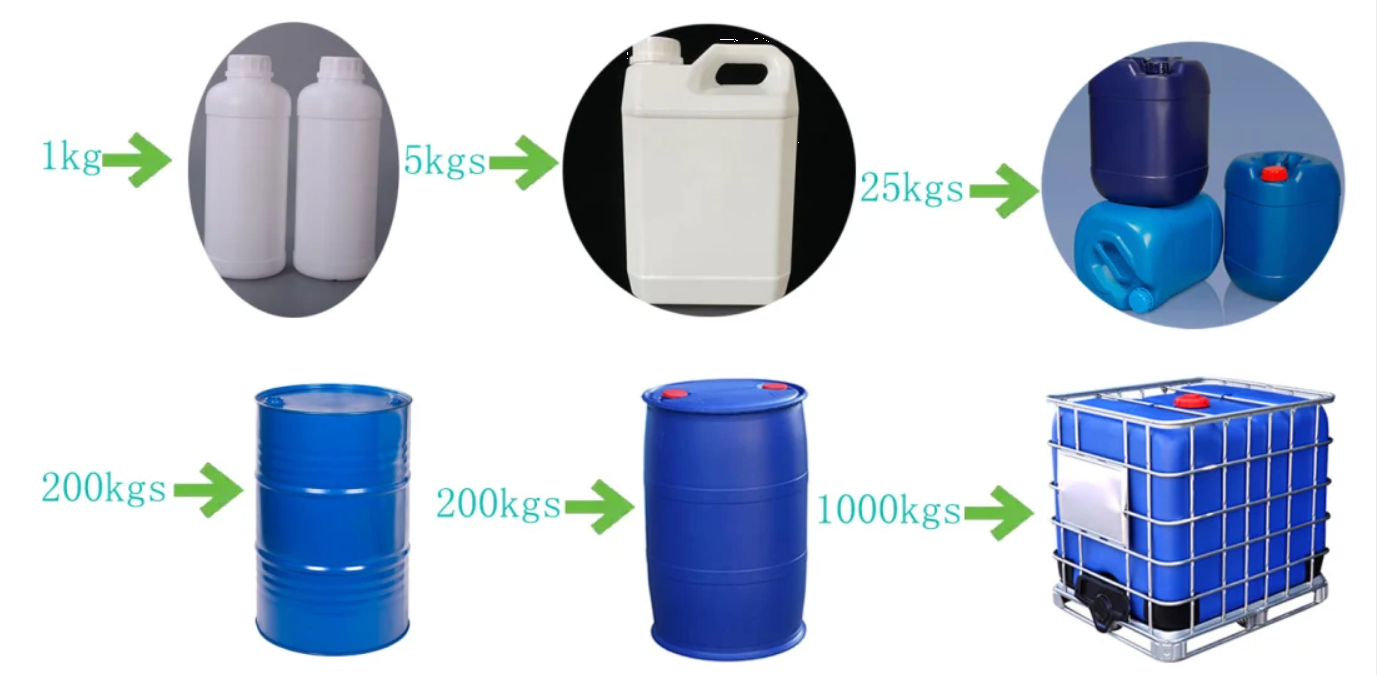
Express
Under 100kg, 3-5Days
Door to door service easy to pick up the goods
By Sea
Over300kg, Around 30 Days
Port to port service professional clearance broker needed
By Air
100kg-1000kg, 5-7Days
Airport to airport service professional clearance broker needed

Pure Natural Sweet Orange Peel Oil is certified by USDA and EU organic, BRC, ISO, HALAL, KOSHER, and HACCP certificates.

While there are many benefits to using pure natural sweet orange peel oil, there are also a few potential disadvantages to be aware of:
Skin Sensitivity: Some individuals may have allergic reactions or skin sensitivities to citrus oils, including sweet orange peel oil. It is recommended to perform a patch test before using the oil topically and to dilute it properly in a carrier oil.
Photosensitivity: Sweet orange peel oil contains compounds that can increase sensitivity to sunlight. It is important to avoid excessive sunlight or UV exposure after applying the oil topically, as it may increase the risk of sunburn or skin damage.
Staining: Orange oils, including sweet orange peel oil, have the potential to stain fabrics, surfaces, and skin. It is advisable to use caution when handling or applying the oil to avoid staining.
Citrus Allergy: Some individuals may have allergies to citrus fruits, including oranges. If you have a known allergy to oranges or other citrus fruits, it is best to avoid using sweet orange peel oil to prevent any potential allergic reactions.
Household Damage: Orange oils, including sweet orange peel oil, can be corrosive to certain materials such as plastic or painted surfaces. It is important to use caution and avoid direct contact with such materials to prevent damage.
Essential Oil Safety: Essential oils are highly concentrated and should be used with caution. It is essential to educate yourself on the proper dilution rates, usage guidelines, and potential contraindications before using sweet orange peel oil.
Pregnancy and Nursing: Pregnant or nursing women should consult with a healthcare professional before using sweet orange peel oil, as certain essential oils may not be recommended during these periods.
Interactions with Medications: Sweet orange peel oil may interact with certain medications, especially those metabolized by the liver. It is advisable to consult with a healthcare professional or pharmacist before using the oil if you are taking any medications.
Quality and Purity: It is important to ensure the quality and purity of the sweet orange peel oil to maximize its effectiveness and safety. Look for reputable brands and sources that provide third-party testing and certifications.
Individual Variations: As with any natural product, individual experiences and reactions may vary. It is important to pay attention to how your body responds to sweet orange peel oil and discontinue use if any adverse reactions occur.
Both sweet orange peel oil and lemon peel oil are citrus essential oils known for their refreshing and uplifting scents. While they share some similarities, they also have a few distinct differences in terms of aroma, benefits, and uses:
Aroma: Sweet orange peel oil has a sweet, warm, and citrusy scent with hints of sweetness. Lemon peel oil, on the other hand, has a bright, zesty, and tangy scent that is more tart and crisp compared to sweet orange peel oil.
Benefits: Both oils have properties that can be beneficial to overall well-being. Sweet orange peel oil is often used for its mood-lifting and calming effects. It is also known to have cleansing and purifying properties when used in household or skincare products. Lemon peel oil is renowned for its energizing and invigorating properties. It is often used to refresh the mind, uplift the mood, and promote concentration and focus.
Skincare: Sweet orange peel oil is often used in skincare products due to its antioxidant properties and ability to promote a healthy-looking complexion. It can help brighten the skin, reduce the appearance of blemishes, and improve overall skin tone. Lemon peel oil is also beneficial for the skin and is commonly used to clarify and tone the complexion, as well as minimize the appearance of oily skin.
Culinary Uses: Lemon peel oil is frequently used in culinary applications to add a burst of citrus flavor to dishes and beverages. It pairs well with both sweet and savory recipes and can be used in desserts, marinades, dressings, and more. Sweet orange peel oil is less commonly used in culinary applications, but it can add a subtle citrus note to certain recipes.
Cleaning: Both oils can be used as natural cleaning agents due to their antiseptic and antimicrobial properties. Lemon peel oil is often used as a natural degreaser and to freshen the air. Sweet orange peel oil can also be used to create homemade cleaning products and to remove sticky residues.
Safety: It is important to note that both sweet orange peel oil and lemon peel oil are photosensitive, meaning they can increase sun sensitivity and potentially cause skin damage if applied topically and exposed to sunlight. It is advisable to avoid excessive sun exposure after applying these oils and to use proper sun protection.
When choosing between sweet orange peel oil and lemon peel oil, consider the specific properties and benefits you are seeking, as well as personal preference regarding scent and potential uses.







